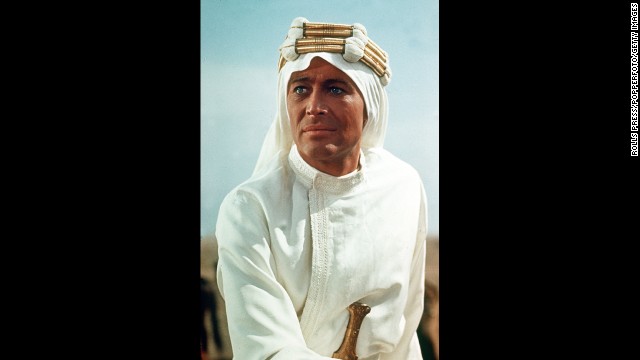Peter O'Toole, 'one of the giants of film and theatre,' dies at 81
December 15, 2013 -- Updated 2247 GMT (0647 HKT)
O'Toole's first major
film role in the title role of T.E. Lawrence in "Lawrence of Arabia" in
1962 was "absolute genius," British film critic Richard Fitzwilliams
told CNN. It earned him the first of eight Academy Award nominations and
propelled him to world stardom.
"Ireland, and the world,
has lost one of the giants of film and theatre," Irish President Michael
D. Higgins said in a statement.
Born in Ireland and
raised in England, O'Toole's acting career began on stage in England as a
teenager, moving later to television roles in the 1950s and then the
big screen.
"His family are very
appreciative and completely overwhelmed by the outpouring of real love
and affection being expressed towards him, and to us, during this
unhappy time," daughter Kate O'Toole said in an written statement.
"Thank you all, from the bottom of our hearts."
O'Toole had "been ill for some time," his daughter said.
"In due course there will
be a memorial filled with song and good cheer, as he would have
wished," she wrote. "We will be happy to speak to you all then but in
the meantime if you could give Peter O'Toole the respect he deserves and
allow us to grieve privately we'd appreciate it."
"On stage and screen, if
their function is to reflect the human condition, then O'Toole did it
absolutely brilliantly with his highs and lows and his remarkable
ability to convey emotion," Fitzwilliams said. "He was so expressive,
and his great triumph was undoubtedly 'Lawrence of Arabia.'"
O'Toole's portrayal of
Lawrence was followed in 1964 by the role of King Henry II in "Becket,"
opposite Richard Burton as Thomas Becket. Both men were nominated for
the best actor Oscar for the film, but both lost.
The pattern of Oscar
nominations, but no statuettes, for O'Toole is unmatched. "Always the
bridesmaid, never the bride," he once said.
GoldDerby.com writer Tom O'Neil said it was one of Hollywood's biggest mistakes, but that O'Toole took the oversight in stride.
O'Toole was nominated
for the best actor Oscar again for playing Henry II opposite Katharine
Hepburn in the 1968 film "The Lion in Winter."
His fourth Oscar nomination came in 1969 for the role of a shy English school teacher in "Goodbye, Mr. Chips."
Although his portrayal
of the 14th Earl of Gurney in the 1972 movie "The Ruling Class" was
nominated for best actor, Fitzwilliams cited it as an example of
O'Toole's overacting.
"He was an actor,
admittedly, of uneven merit, but what you had was this phenomenal life
force, almost a wayward genius," Fitzwilliams said.
O'Toole's battle with an
alcohol addiction hampered his career in the 1970s, but he staged a
comeback with his 1980 leading role in "The Stunt Man." It brought him a
sixth best actor nomination from the Academy.
He mocked his own image
as an over-the-hill, alcoholic matinee idol in "My Favorite Year"
(1982). He was again nominated for best actor but did not win.
O'Toole was presented an
honorary Oscar by Meryl Streep during the 2003 Academy Awards. The
engraving on the gold statuette reads: "Whose remarkable talents have
provided cinema history with some of its most memorable characters."
But he was not done. He
was also nominated for the best actor Oscar for his role as an aging,
out-of-work actor obsessed with a young woman in the 2006 film "Venus."
He acknowledged in 2012 that his acting career had ended, bidding a "profoundly grateful farewell" to the industry.

